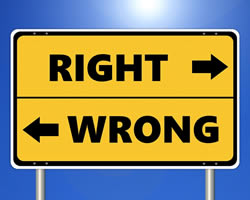Fiona Pepper and Cathy Pryor* say they consulted experts to find out how to define ‘ethics’ and how to translate it into a workplace setting.

Image: Tumisu
Are you ethical at work?
You might say yes, but tackling issues of right and wrong — and all the grey areas in between — can actually be very tricky.
“It can be a very difficult thing,” says David Burfoot from the Ethics Centre in Sydney.
So what questions should you ask yourself when faced with an ethical dilemma in the workplace?
We asked the experts to nut out some scenarios that might test our ethical mettle.
What are ethics, anyway?
First, we need to know just how we define ethics, and how that translates into a workplace setting.
“Socrates is a big person in the field of ethics and he described it as ‘what ought one to do?’,” Mr Burfoot told RN’s This Working Life.
“‘What ought’ means we have a choice about what we do.”
“‘One’ means it’s not what you or I would do in that situation, it’s what anybody should do in that situation.”
“And ‘do’ is about action — it’s about how your thoughts manifest in the world.”
Mr Burfoot says in the workplace, ethics are about “making decisions that align with your values and those of the organisation”.
Vanessa Pigrum, CEO of Cranlana Centre for Ethical Leadership in Melbourne, believes language is one of the biggest challenges around defining ethical frameworks.
“Some of the language is very abstract, which can give the impression that ethics is this completely cool rational system to apply to the decisions in front of you,” Ms Pigrum says.
“Ethics wraps up everything including your fears, your anticipation, your motivations — all of these things make it very complex, and equally an emotional decision as it is a rational one.”
Put your ethics through their paces
We put three scenarios to the experts, and asked them to talk us through their thinking.
Ethical dilemma: Upper management has an idea that you think is really bad, but you have to be the face of that idea and deliver the message. You know it’s contrary to evidence and best practice. What do you do?
Ms Pigrum says the first step when you’re feeling ethically torn is to ask what the facts are and consider the choices — even the “unpalatable” ones.
“Often we dismiss the choice that we could say no to something,” she says.
“We need to really consider that that is a real choice.”
Then we look at the moral dilemmas of every choice, and how they line up with your values.
Ms Pigrum says this scenario presents a number of options:
- “I could just do it, it doesn’t matter, there are only a few people listening to the presentation.”
- “I could just get away with doing it half-strength … I could water down the wording. I could be non-explicit in the detail.”
- “I could decide to have some courage and correct the facts and push back, and go back to management and try to get a more accurate version put forward.”
- “I could simply refuse. I could say my integrity is too important, I refuse to do it.”
But with each decision, Ms Pigrum says, there is a range of risks, harms and benefits.
She says you could consider questions like: “What is the impact of the decision on the people around me? What is the culture that I’m creating by making this choice? Who am I influencing? Am I setting a standard that others think is OK?”
Ethical dilemma: Your boss confides in you that there will be redundancies which will likely affect your friend and colleague who is considering taking out a loan for a house.
You colleague asks you if you know whether there is going to be any restructuring. Do you tell them?
Ms Pigrum says this is a classic example of individual ethics colliding with what we’re expected to do at work.
Initially, she says it’s important to “go through how certain you are of the information that you’ve been given”.
Then, you should consider your choices and the risks of going down each path — could your friendship be at stake, or your job?
“What is the harm that will happen if you share the information, or if you keep the information?” Ms Pigrum says.
“One of the core tenets of ethics is to minimise the harm that is happening to the people around you.”
Tribalism can play a big role in our decision-making.
“That means we try to stick with our own, we try to protect our own,” Mr Burwood says.
Ms Pigrum says in these decisions, you need to think carefully about which tribe you belong to: is your tribe your friend, or your boss and your greater workplace?
Making the ethical choice, in any scenario
When defining your own moral compass, regardless of the scenario, there are some key questions to ask yourself, Mr Burfoot says.
These are:
- If what you did about this situation was on the front of the paper tomorrow morning, how would you feel?
- If your child asked you for advice in this situation, what would you tell them?
- That wise person in your head whom you admire, what would they do in this situation?
Mr Burfoot says while they may appear to be simple questions, they can really help “expose a situation”.
“If we get to the end of those questions and we still have the same decision in mind, we’ll generally feel much more confident,” he says.
Ms Pigrum says the onus isn’t all on an individual, either — workplaces also have a part to play.
“If you don’t foster a work environment where people feel safe to speak up, to question, to challenge or just to be curious about why an organisation is working in a particular way, then a terrible silence develops,” she says.
“And in that silence, people can get away with all sorts of things.”
* Fiona Pepper is a Digital Producer for Radio National in Melbourne. Cathy Pryor is a radio producer for RN’s Blueprint for Living. She tweets at @cathpryor.
This article first appeared at www.abc.net.au.











